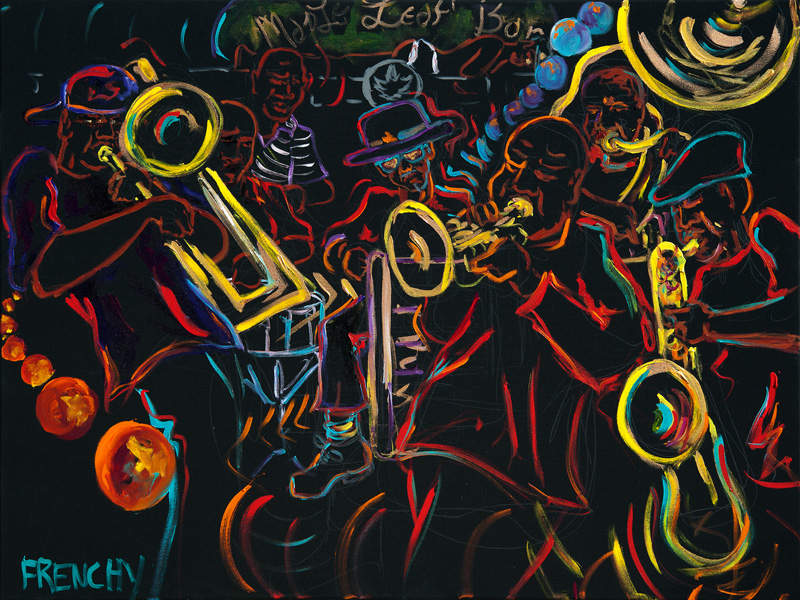
New Orleans is considered by many to be the "birthplace of jazz." While jazz is fairly commonplace in modern times, without New Orleans and its complex history it is difficult to say if jazz would have been able to emerge and spread elsewhere. Indeed, New Orleans had just the right combination of elements to lead to the birth and proliferation of jazz music.
To begin with, New Orleans was a city where music was ubiquitous. Many different types of music were simultaneously present in New Orleans, and without any one of these integral genres, the recipe for the creation of jazz would not have been complete. These highly important music styles were ragtime, blues, and brass band instrumentation. Each one of these components of jazz happened to be present in New Orleans for varying reasons.
Blues, although avoiding mainstream appeal until about 1920, gained popularity in New Orleans before most other areas. This genre is based on a specific three-chord progression that is vital to the sound of the music. This unique tone structure is speculated to have been created when slaves arrived and attempted to merge certain African scales with Western scales (Gioia). Essentially, the syncretism between the music of these two differing cultures led to the creation of blues, a genre that would later be vital to the creation of jazz.
 |
| Blues musician |
Ragtime was equally necessary for jazz to come into existence. Most ragtime pieces were centered around the pianist, with his left hand keeping a steady rhythm while his right hand scattered around the keys in a syncopated, off-beat fashion (Gioia). This heavy syncopation would later become an easily recognizable staple of jazz music. In fact, the similarities between the rhythms of these genres are so clear that "ragtime" and "jazz" were referred to somewhat interchangeably during the initial rise of jazz music.
 |
| Scott Joplin, famous ragtime composer |
Lastly, the instrumentation used by brass bands in New Orleans was the last element needed to allow for the birth of jazz. The city had a distinct fondness for brass bands, as they were used as entertainment at various social events. These bands consisted of trombones, basses, tubas, clarinets, horns, and more. As ragtime music grew in popularity, these bands began to employ syncopation in their compositions, further diminishing the lines between these genres (Gioia). The variety of instruments played by these bands would eventually be utilized by and be integral to jazz compositions.
 |
| Brass band |
Altogether, New Orleans had the perfect combination of musical styles for jazz's creation; it just needed someone to mix these styles together well enough. Gioia accredits this accomplishment to Buddy Bolden, a man that is somewhat mysterious as there are not even any recordings of his work. Regardless of whether or not Bolden was truly the first to mesh together ragtime, blues, and brass instrumentation, the city of New Orleans only had a matter of time before its musical styles were melded by some forward-thinking musician.
 New Orleans is considered by many to be the "birthplace of jazz." While jazz is fairly commonplace in modern times, without New Orleans and its complex history it is difficult to say if jazz would have been able to emerge and spread elsewhere. Indeed, New Orleans had just the right combination of elements to lead to the birth and proliferation of jazz music.
New Orleans is considered by many to be the "birthplace of jazz." While jazz is fairly commonplace in modern times, without New Orleans and its complex history it is difficult to say if jazz would have been able to emerge and spread elsewhere. Indeed, New Orleans had just the right combination of elements to lead to the birth and proliferation of jazz music.



Jared,
ReplyDeleteI thoroughly enjoyed your breakdown of the blues, ragtime, and brass bands- the three types of music prominent in New Orleans around the turn of the 20th century. Analyzing each genre in a separate paragraph and including pictures made your response very digestible and easy to read. I agree with your interpretation that innovators like Bolden fused elements of blues, ragtime, and brass to create the newer sounds unique to Jazz. Moreover, I like that you don't solely accredit Bolden as the father or creator of Jazz, but instead you suggest that "it's only a matter of time before the musical styles were melded by some forward-thinking musician."
I really liked how you accredited jazz's creation to the combining of music styles over time within New Orleans. You took a very musical approach to the prompt rather than a historical one like many of the blogs. I agree with the combination of music being one of the biggest factors in creating jazz. It's easy to give the credit to various historical events and people, but to look at the music itself and break down the different genres that had to be combined to make it is considerably more difficult at times but often fairly rewarding. I also agree with Michael about your reference to Buddy Bolden, as not necessarily the father of jazz, but merely the first one who got around to doing it.
ReplyDeleteI thought I knew a few things, but apparently I didn't know anything. This is all very interesting and fun to check out. The art/photos really add a lot to the feel of things. When are you scheduled to make another post?
ReplyDelete